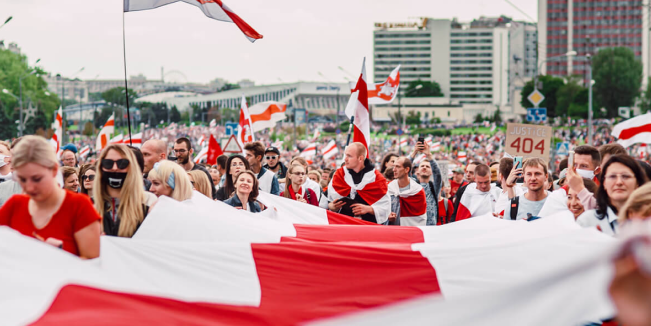The government responded to these protests with unprecedented violence: tens of thousands of people were detained, hundreds of cases of torture were reported, and some protesters were killed by law enforcement. The government also shut down the last remaining media outlets, closed dozens of NGOs, and vastly expanded the powers of the country’s already pervasive security apparatus.
Two years later, repression in the country continues, and the democratic world must act to lend a helping hand to those who continue to advocate for a free Belarus. Doing so would not only promote respect for human rights and liberal democracy, but would also be pragmatic.
For the first 26 years of his rule, Lukashenko’s repression was largely confined to his own country. Journalists and political opponents were routinely arrested, thrown in jail, and assassinated. Yet the country coexisted with its neighbors, at times even going through periods of a thaw in its relationships with Western democracies. That changed in 2020, when Lukashenko’s brutal tactics against his own people put him on a warpath against the international community, and put an end to any hopes that a reasonable dialogue with him is possible.
Isolated, sanctioned by his Western neighbors, and knowing that his only ally now is the Kremlin, Lukashenko started creating crises that menaced the international community and had a global impact.
In May of 2021, Belarusian authorities hijacked a commercial airplane that was flying from Greece to Lithuania and arrested a prominent opposition journalist who was on board. The crisis led to a closure of European airspace for Belarusian planes, further sanctions, and the rerouting of flights in Europe.
During the Summer Olympics in Tokyo, Belarusian authorities tried to repatriate Belarusian athlete and sprinter Krystsina Tsimanouskaya, who had made several statements critical of the government, causing a major international scandal. There was also a mysterious death of an activist who fled from Belarus to Ukraine, further raising concerns that Belarusian activists who have fled the regime are not even safe abroad.
In late 2021, Lukashenko aimed to disrupt the European Union (EU) by encouraging a massive immigration crisis at the border with Poland, when he lured migrants from the Middle East into Belarus and then forced them to cross into Poland. The crisis led to deaths of dozens of migrants and had an effect on international trade, as some of the most critical trading routes between Russia, China, and the EU go through Belarus.
Most notably, this year, Lukashenko allowed Russia to use Belarus’ territory, despite overwhelming opposition from Belarusians, to attack Ukraine. He also permitted Russia to use Belarus’ railway systems to supply the Russian army, and provided Belarus’ airspace and territory for Russia to launch countless airstrikes that kill innocent civilians. Now, there are talks about deploying Russia’s nuclear weapons in Belarus — right at NATO’s doorstep.
It is obvious that as time goes by, the price of containing Lukashenko only grows. If we do not stop him now, he will continue menacing the international community and destabilizing international norms.
The best way to counter Lukashenko is to support the network of Belarusian funds, organizations, and cultural initiatives that were established in the wake of the 2020 protests. Most of them relocated outside of Belarus in the face of repression, and currently operate in the EU and the United States. These initiatives perform crucial work, from raising money for political prisoners to unmasking officers involved in human rights abuses. Providing them with the assistance they need will strengthen the Belarusian community while weakening Lukashenko’s regime.
When it comes to such support, democratic countries should follow the lead of Poland and Lithuania. Belsat TV, an independent media outlet created by the Polish government in cooperation with the Belarusian Association of Journalists, broadcasts in Belarusian and plays a big role in providing alternative views to those presented by Lukashenko’s media. Political support given to Tsikhanouskaya by the Lithuanian government has helped her become an internationally-recognized political force who stands for a democratic Belarus. Simplified visa procedures have allowed tens of thousands of Belarusians to escape repression and continue to work as activists, journalists, and express their desire for freedom. Cultural groups like Belaruski Dom and the Belarusian Solidarity Centre in Warsaw give Belarusians a community for independent cultural expression.
Parallel to that, democratic states must maintain their pressure on Lukashenko’s regime. Seeing the disastrous consequences of the war in Ukraine, Lukashenko is now trying to distance himself from the conflict. Democracies must not fall for it: he is a culprit and must be viewed as an active agent in this war. In early July, the United Kingdom imposed additional sanctions on Belarus for its role in the war. That is a step in the right direction, and other democracies must follow to make such measures more effective.
Lukashenko presides over the last true dictatorship in Europe — in a country that has fewer civil liberties than Russia or Burma. Ending his rule will not only bring freedom to Belarusians, but also improve peace and prosperity in the entire region. Though the fight against Lukashenko may be long, the dividends of a free and independent Belarus will far outweigh the costs of our efforts.
Belarusians needs your support now. HRF’s Belarus Solidarity Fund has provided a lifeline to democracy movements in #Belarus.
You can help HRF raise funds for Belarusian activists, journalists, & victims of government repression.








